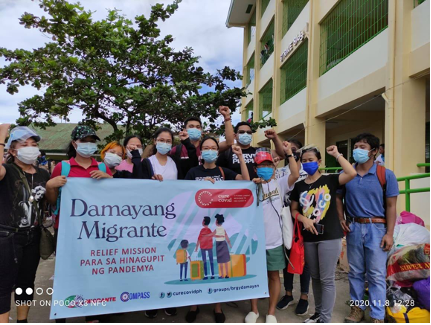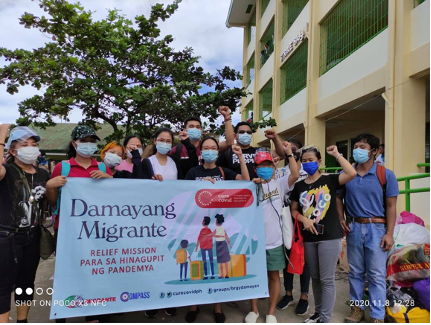
COVID Migrant Monitor Report 1 - Response to crisis situation of migrants
COVID Migrant Monitor Project Report
Building cooperation and solidarity in the midst of pandemic crisis
[Part 1: Response to crisis situation of migrants]
“…for I was hungry and you gave me food, I was thirsty and you gave me something to drink, I was a stranger and you welcomed me, I was naked and you gave me clothing, I was sick and you took care of me, I was in prison and you visited me.’ Then the righteous will answer him, ‘Lord, when was it that we saw you hungry and gave you food, or thirsty and gave you something to drink? And when was it that we saw you a stranger and welcomed you, or naked and gave you clothing?”
Matthew 25:35-38
The COVID Migrant Monitor project is an initiative of the Asia Pacific Mission for Migrants (APMM) to respond to the situation of migrants in the region during the pandemic. It consists of three major components: 1. Delivery of services immediately needed by migrants including food relief, communication assistance, counselling to navigate changing immigration and labor policies, and referral services; 2. Advocacy and campaigns to counter the invisibility of migrants, influence policies to make them positive to the rights of migrants, and challenge policies and programs that are detrimental to the rights of migrants; and, 3. Information dissemination activities that relay important news to migrants such as country restrictions, policies under the pandemic that impact on migrants, community services available, and advocacy and campaign work on the ground.
APMM collaborated with members of the Interfaith Network for the Rights of Migrants or INFORM and the International Migrants Alliance (IMA), as well as our partner organizations in Hong Kong, South Korea, Thailand, Malaysia, Bangladesh, Indonesia, Philippines, Australia and Japan, to implement the project.
The APMM, in close coordination with its partners in said countries and interfaith network, reached out to the broadest number of migrants, conducted campaign, advocacy and lobbying, delivered welfare services and assistance, and spoke on various issues that put migrants in a most vulnerable situation.
The COVID Migrant Monitor as a collaborative project helped in strengthening solidarity and partnership among migrants and their families, serving institutions and faith communities in the region. Together with grassroots migrants at the forefront, it provided venues to articulate their issues and show how migrants and their families lost their jobs and source of income, excluded and discriminated. As one foreign domestic worker in Hong Kong said: If not for the APMM and the United Filipinos in Hong Kong (UNIFIL-Migrante-Hong Kong) I will not survive the 14-day quarantine. For the entire 14 days of my quarantine, my employer paid for the cheapest quarantine hotel and only gave me 14 packs of cup noodles and 14 bottles of 380ml water.
The cooperation conducted and partnership formed opened new opportunities for continuing advocacy, campaign and lobbying including the upcoming Global Compact for Safe, Orderly and Regular Migration (GCM) review process. It is hoped that this can be further developed to provide more venues for grassroots migrants to advance their agenda in a post-pandemic situation where migrants, refugees and uprooted people are included, treated justly and humanely.
Close coordination with APMM partners in the targeted countries as well as in other areas in the region helped in the smooth implementation of the project. Getting our partners involved in the planning, monitoring and execution of the different components of the project made them embrace its objectives and ensure its success.
1. Response to crisis situation of migrants
Part of the project was providing to the urgent needs of migrants in targeted countries such as Thailand, South Korea, Japan, Philippines, Hong Kong and Australia. Responding to the crisis situation of migrants under the pandemic provided more on-the-ground information that formed the bases of advocacies conducted in countries like in Indonesia, Bangladesh, Thailand, Philippines and South Korea. As a migrant of South Korea mentioned in his story: “I lost my job early in the outbreak of COVID-19. But the timely response of KASAMMA-KO and APMM made me survive this crisis. Now, together with other migrants in Korea, we continue our advocacy to include migrants, especially the undocumented migrants, in government’s service and assistance.”
Helping migrants with their immediate needs during the pandemic is essential to the empowerment of migrants for them to confront policies that exclude, discriminate, neglect and abandon migrants and their families.
The project provided food relief, medical assistance and provisions of personal protective equipment (PPE) to at least 207 migrants and their families in Thailand, South Korea, Japan, Hong Kong and the Philippines. It also enabled grassroots organisations to pursue activities that broadened the support for immediate needs of migrants in crisis.
Service delivery and assistance to migrants and their families were facilitated through APMM partners such as Bethune House Migrant Women Refuge, Mission for Migrant Workers and United Filipinos in Hong Kong, ACTION Thailand, KASAMMA-KO (South Korea), Migrante International (Philippines), and KAFIN (Japan). Food relief were also provided to international students under temporary visa in Australia through Damayang Migrante. Food and economic relief were provided to migrants who lost their jobs in tourism industries in Thailand, undocumented migrants in South Korea and returned migrants and their families in Indonesia, Bangladesh and the Philippines.
Joebel, an undocumented migrant in South Korea with two children and was abandoned by her Korean husband narrated: “Due to COVID-19 pandemic I lost my job in Songtan that put my family in further vulnerability. The food relief I received from KASAMMA-KO made my family survive from hunger.”
Migrants in Thailand and South Korea received additional provisions for personal protection and equipment (PPE) such as facemasks, alcohol and sanitizer. The situation in the said countries, particularly in South Korea prohibited, undocumented migrants to buy their own PPE’s due to government policy that required buyers to present their IDs prior to procurement.
Provisions for call card and internet card for communication to their families back home, counselling purposes and attendance to various webinars were also provided to migrants in some countries.
1. Food and Economic Relief. Job loss and no work, no pay arrangement were the more common impacts to migrants in the region. Migrants and their families in Japan, Thailand, South Korea, Hong Kong, Philippines and Australia who lost their jobs called for food and economic relief as they continue to scout for means to survive while stranded and under quarantine.
Philippines. Food and economic relief were provided to returned and stranded migrants in the Philippines. The militaristic response of the Philippine government to COVID pandemic crisis left thousands of them unserved, abandoned and neglected in quarantine areas and even in the hallways of the Ninoy Aquino International Airport. Migrante International through the Damayang Migrante Project distributed food packs and PPEs (face mask, alcohol and sanitizer) to quarantined and stranded migrants in the National Capital Region and those stranded in the airport.
Damayang Migrante even organized a community kitchen to provide food for hundreds of quarantined, returned and stranded OFWs. One of the returned OFWs narrated: “We are very thankful to leaders and members of Migrante International. Despite the community quarantine, they were able to reach us and provide us with something to eat.”
Hong Kong. Returned and newly hired foreign domestic workers are required by Hong Kong government to quarantine for 14 days in various hotels in Hong Kong. Employers of foreign domestic workers are required to shoulder the expenses during quarantine period. The cheapest expense for accommodation and food for the entire period of staying in a hotel is around HK$3500 to HK$4000.
APMM and its partners found out that quarantined foreign domestic workers were provided with 14 cups of noodles, 14 380-ml bottled water, 14 canned soft drinks and rice meal every dinner. Such provisions were inadequate for FDWs to survive the entire period. APMM and its partners helped more than 55 quarantined FDWs in various hotels in Hong Kong and distributed food packs that included lunch, canned goods, bread, first aid medicine, PPEs etc.
Japan, Thailand, South Korea and Australia. Food and economic relief were provided to migrants who lost their jobs in tourism industries and others in Bangkok and Phuket through the ACTION Thailand. The same was done with more than 30 undocumented migrants and their families in South Korea. The KASAMMA-KO in South Korea distributed sacks of rice, kilos of chicken and pork, and instant noodles to migrants and those who were staying at Osan Migrant Center. Meanwhile in Australia, the Damayang Migrante distributed food packs to international students and other migrants under temporary visa who were excluded in government’s food and economic relief.
2. Medical assistance. The project provided medical assistance to two migrant workers in Thailand and South Korea. They needed urgent medical follow-up check while under quarantine. APMM, ACTION Thailand and KASAMMA-KO made an appeal on their behalf and provided them with necessary assistance. Bert (not his real name) a migrant worker in South Korea narrated: I was suffering from kidney problem and the doctor advised me to have a laboratory test. But the thing is I do not have money for I lost my job due to COVID. I am very thankful to KASAMMA-KO for reaching-out to its partner who helped me with my medical needs. Now my kidney is fine and am volunteering with KASAMMA-KO in counselling and other advocacy works.
3. Counselling service amidst COVID. Counselling assistance in the context of changing immigration and labor rules was provided during the pandemic. APMM and its partners in the region overcame the lack of mobility to render counselling assistance to distress migrants by distributing 100 internet cards and phone cards for online counselling and communication to their families. Though still very much limited, online counselling is a viable alternative to immediately reach out to migrants facing various cases of abuse and exploitation and other issues affecting their lives and welfare.
Damayang Migrante - relief efforts of Migrante International to returned migrants, families of migrants in the Philippines

ACTION-Thailand leads food and other forms of relief for migrants in various parts of Thailand

Efforts of KASAMMAKO and various organizations to support migrants in South Korea

Various chapters of Migrante in Australia reach out to distressed international students, migrant workers and refugees.


